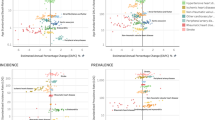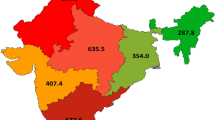Abstract
Background
The global burden of inflammatory bowel disease (IBD) is reportedly increasing. Methodologies and datasets are routinely updated, allowing for more accurate estimates to guide healthcare policy.
Methods
The Global Burden of Diseases, Injuries and Risk Factors Study (GBD) dataset was accessed and the trends in IBD at the global and regional levels from 1990 to 2019 were estimated for incidence, prevalence, deaths, years of life lost (YLL), years lived with disability (YLD) and disability-adjusted life-years (DALYs) per 100,000 population. The three decadal trends of the disease measures were calculated.
Results
In 2019, there were 4.9 million (95% Uncertainty Interval [UI] 4.3–5.5) cases of IBD globally. The age-standardized prevalence and incidence rates decreased from 73.23 (95% UI 63.8–83.6) and 6.1 (95% UI 5.3–6.9) in 1990 to 59.2 (95% UI 52.7–66.4) and 4.9 (95% UI 4.4–5.6) in 2019, respectively. Like prior estimates, the highest age-standardized prevalence and incidence rates occurred in North America, but the lowest rates were reported in Oceania (209.5 [195.4–224.4] and 24.5 [22.6–26.7] and 3.87 [3.1–4.7] and 0.5 [0.5–0.7], respectively) and not the Caribbean, as previously reported. High socio-demographic index (SDI) locations had the highest age-standardized prevalence rate, though the rates declined in 2019 compared to 1990. The age-standardized prevalence and incidence rates increased in middle, low middle and low SDI quintiles over the three decades. The age-standardized rates for deaths, DALYs, YLD and YLL decreased globally from 1990 to 2019. Between 1990 and 2019 the total number of patients with IBD in India doubled from 0.13 million (95% UI 0.10–0.16) to 0.27 million (95% UI 0.21–0.33) with age-standardized incidence rate increasing from 2.23 (95% UI 1.85–2.73) to 2.34 (95% UI 1.95–2.86).
Conclusion
This analysis of the GBD 2019 database demonstrates that the overall global burden of IBD is lower than previously estimated, but an increasing disease burden is observed in the middle and low-SDI locations.
Graphical Abstract





Similar content being viewed by others
Data availability
This article contains information of the GBD study 2019 database, which is available under open data commons attribution license through Global Burden of Diseases Collaborative Network. (available from http://gndx.healthdata.org/gbd-results-tool).
References
Kaplan GG, Windsor JW. The four epidemiological stages in the global evolution of inflammatory bowel disease. Nat Rev Gastroenterol Hepatol. 2021;18:56–66. https://doi.org/10.1038/s41575-020-00360-x.
Ananthakrishnan AN, Kaplan GG, Ng SC. Changing Global epidemiology of inflammatory bowel diseases: Sustaining health care delivery into the 21st Century. Clin Gastroenterol Hepatol. 2020;18:1252–60. https://doi.org/10.1016/j.cgh.2020.01.028.
Mak WY, Zhao M, Ng SC, Burisch J. The epidemiology of inflammatory bowel disease: East meets west. J Gastroenterol Hepatol. 2020;35:380–9. https://doi.org/10.1111/jgh.14872.
Windsor JW, Kaplan GG. Evolving epidemiology of IBD. Curr Gastroenterol Rep. 2019;21:40. https://doi.org/10.1007/s11894-019-0705-6.
Knowles SR, Graff LA, Wilding H, Hewitt C, Keefer L, Mikocka-Walus A. Quality of life in inflammatory bowel disease: A systematic review and meta-analyses-Part I. Inflamm Bowel Dis. 2018;24:742–51. https://doi.org/10.1093/ibd/izx100.
Vos T, Lim SS, Abbafati C, et al. Global burden of 369 diseases and injuries in 204 countries and territories, 1990–2019: A systematic analysis for the Global Burden of Disease Study 2019. Lancet. 2020;396:1204–22. https://doi.org/10.1016/S0140-6736(20)30925-9.
GBD 2017 Inflammatory Bowel Disease Collaborators. The global, regional, and national burden of inflammatory bowel disease in 195 countries and territories, 1990-2017: a systematic analysis for the Global Burden of Disease Study 2017. Lancet Gastroenterol Hepatol. 2020;5:17–30. https://doi.org/10.1016/S2468-1253(19)30333-4.
Gujarati DN, Sangeetha. Basic Econometrics. Tata McGraw Hill. 2007.
Piovani D, Danese S, Peyrin-Biroulet L, Nikolopoulos GK, Lytras T, Bonovas S. Environmental risk factors for inflammatory bowel diseases: An umbrella review of meta-analyses. Gastroenterology. 2019;157:647–59.e4. https://doi.org/10.1053/j.gastro.2019.04.016.
Agrawal M, Shah S, Patel A, Pinotti R, Colombel JF, Burisch J. Changing epidemiology of immune-mediated inflammatory diseases in immigrants: A systematic review of population-based studies. J Autoimmun. 2019;105:102303. https://doi.org/10.1016/j.jaut.2019.07.002.
Gearry RB, McCombie AM, Vatn M, et al. What are the most challenging aspects of inflammatory bowel disease? An International Survey of Gastroenterologists Comparing Developed and Developing Countries. Inflamm Intest Dis. 2021;6:78–86.https://doi.org/10.1159/000512310.
Fiorino G, Danese S. Diagnostic delay in Crohn’s Disease: Time for Red Flags. Dig Dis Sci. 2016;61:3097–8. https://doi.org/10.1007/s10620-016-4298-8.
Yamamoto-Furusho JK, Parra-Holguín NN. Diagnostic delay of inflammatory bowel disease is significantly higher in public versus private health care system in Mexican patients. Inflamm Intest Dis. 2021;7:72–80. https://doi.org/10.1159/000520522.
Funding
Bill and Melinda Gates Foundation funded the GBD 2019 study. Those who funded this study had no role in study design, data collection, data analysis, data interpretation or the writing of the report.
Author information
Authors and Affiliations
Contributions
Guarantor of article: Ajit Sood. Specific author contributions. KD: Conceptualization (Equal); Data curation (Equal); Formal analysis (Equal). Investigation (Equal); Methodology (Equal); Software (Equal); Visualization (Equal); Writing – original draft (Equal); Writing – review and editing (Equal). ArS: Data curation (Equal); Formal analysis (Equal); Investigation (Equal); Methodology (Equal); Software (Equal); Visualization (Equal); Writing – original draft (Equal); Writing – review and editing (Equal). SS: Conceptualization (Equal); Data curation (Equal); Formal analysis (Equal); Methodology (Equal); Software (Equal); Writing – review and editing (Equal). VM: Project administration (Equal); Resources (Equal); Supervision (Equal); Visualization (Equal); Writing – review and editing (Equal). KK: Resources (Equal); Supervision (Equal); Visualization (Equal); Writing – review and editing (Equal). RM: Project administration (Equal); Visualization (Equal); Writing – review and editing (Equal). PSD: Methodology (Equal); Resources (Equal); Visualization (Equal); Writing – review and editing (Equal). AS: Conceptualization (Equal); Investigation (Equal); Methodology (Equal); Project administration (Equal); Resources (Equal); Supervision (Equal); Visualization (Equal); Writing – review and editing (Equal). All authors approved the final version of the article, including the authorship list.
Corresponding author
Ethics declarations
Ethical approval and consent to participate
The study was approved by the institutional review board (IEC number DMCH/R&D/2020/23). The corresponding author had full access to the data in the study and final responsibility for the decision to submit for publication. This is a report derived from GBD 2019 database. Hence the patients were not directly involved. Appropriate consenting procedures were followed in the GBD 2019 study.
Human ethics
The study was approved by the institutional review board (IEC number DMCH/R&D/2020/23).
Consent for publication
This is a review report derived from GBD 2019 database. Hence the patients were not directly involved. Appropriate consenting procedures were followed in the GBD 2019 study.
Conflict of interest
Parambir S. Dulai has received grants from and/or consults for Takeda, Janssen, Pfizer, Abbvie, Gilead, BMS, Novartis, Lilly, Abivax, PreciDiag, Addiso, GSK and Prometheus. Ajit Sood reports receiving honorarium for speaker events from Pfizer India. KD, AS, SS, VM, KK and RM declare that they have no conflict of interest.
Disclaimer
The authors are solely responsible for the data and the content of the paper. In no way, the Honorary Editor-in-Chief, Editorial Board Members, the Indian Society of Gastroenterology or the printer/publishers are responsible for the results/ findings and content of this article.
Additional information
Publisher's note
Springer Nature remains neutral with regard to jurisdictional claims in published maps and institutional affiliations.
Khushdeep Dharni and Arshdeep Singh contributed equally and share the first authorship.
Supplementary Information
Below is the link to the electronic supplementary material.
12664_2023_1430_MOESM1_ESM.pdf
Supplementary Figure 1 The three decadal trends in A) incidence and B) prevalence of IBD in different GBD regions. (PDF 1169 KB)
12664_2023_1430_MOESM2_ESM.pdf
Supplementary Figure 2 Global estimates of Inflammatory bowel disease measures on the basis of age (both sexes) (1990-2019) A) Non-mortality measures B) Mortality measures (PDF 898 KB)
12664_2023_1430_MOESM3_ESM.pdf
Supplementary Figure 3 The three decadal trends in a) deaths b) disability adjusted life years (DALYs) c) years lived with disability (YLDs) and d) years of life lost (YLLs) due to IBD in different GBD regions. (PDF 3042 KB)
12664_2023_1430_MOESM4_ESM.pdf
Supplementary Figure 4 Trends from 1990 to 2019 in number and age-standardised rates of disability due IBD at the global level (PDF 1252 KB)
Rights and permissions
Springer Nature or its licensor (e.g. a society or other partner) holds exclusive rights to this article under a publishing agreement with the author(s) or other rightsholder(s); author self-archiving of the accepted manuscript version of this article is solely governed by the terms of such publishing agreement and applicable law.
About this article
Cite this article
Dharni, K., Singh, A., Sharma, S. et al. Trends of inflammatory bowel disease from the Global Burden of Disease Study (1990-2019). Indian J Gastroenterol 43, 188–198 (2024). https://doi.org/10.1007/s12664-023-01430-z
Received:
Accepted:
Published:
Issue Date:
DOI: https://doi.org/10.1007/s12664-023-01430-z




